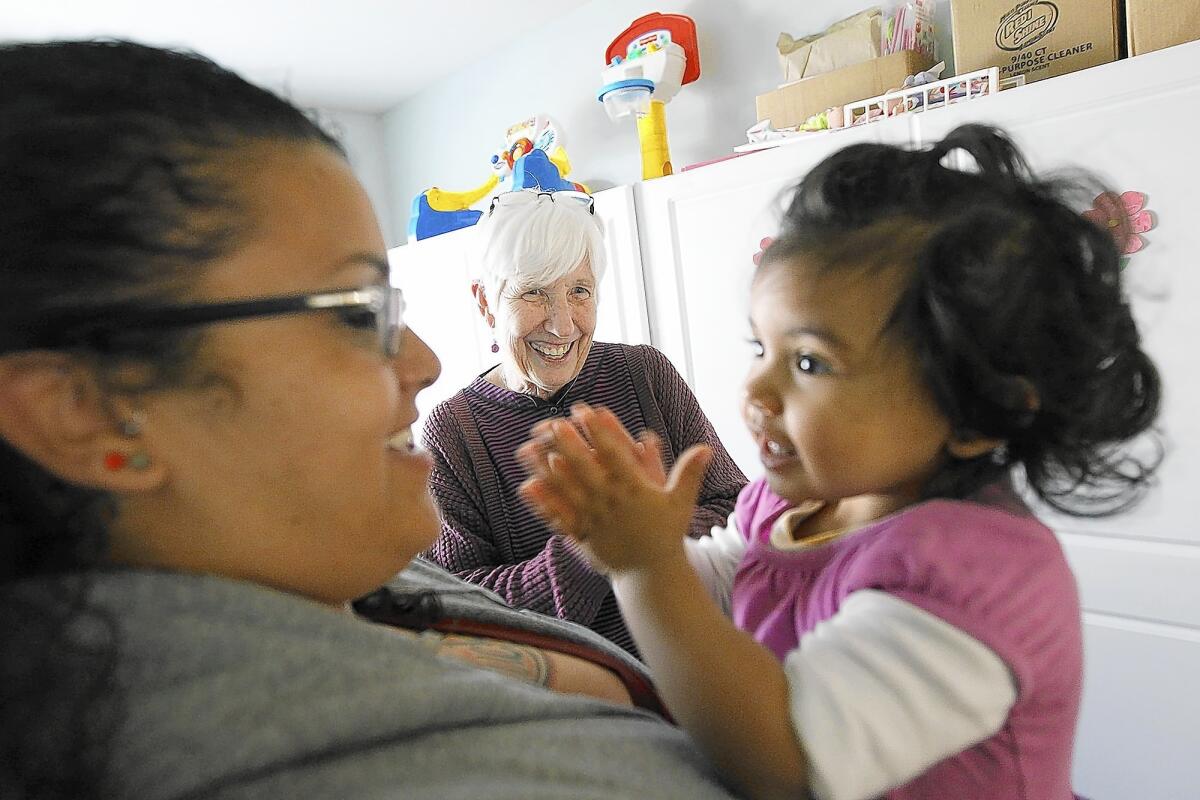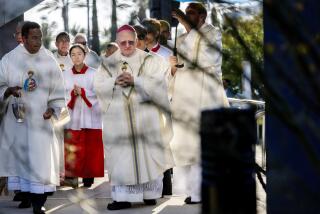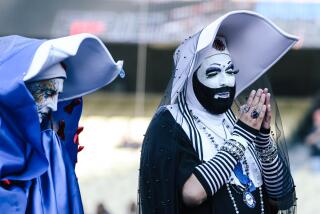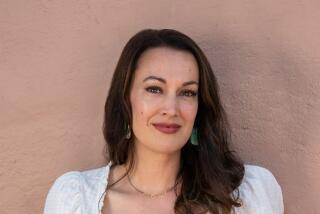A renegade and a feminist, Sister Judy is still keeping the faith

- Share via
Sister Judy Vaughan skipped the 1989 celebration of her 25th anniversary as a Catholic nun; the male-celebrated liturgy offended her emerging feminism. She spent the evening instead in El Salvador, challenging right-wing forces that had declared war on supporters of “liberation theology.”
She’d already been threatened with dismissal several times by church leaders for flouting canonical teachings.
But both Sister Judy and the Catholic Church have mellowed some since then.
Last Saturday, she celebrated her 50th anniversary — her Jubilee — in the pews with her St. Joseph of Carondelet sisters, renewing vows of poverty, chastity and obedience to God.
It wasn’t an easy decision to attend, but not because of ecclesiastical disagreements. Her daughter was competing in a track meet that afternoon. The nun would miss the race, but slip away in time to make it to the teenager’s cheerleading competition that evening.
Sister Judy, at 68, is still a feminist and a renegade — a nun with an adopted daughter and little use for “the institutional church.”
But she is also a woman whose faith in God and commitment to serve the poor and wounded have never been stronger.
::
Vaughan grew up in Los Angeles in a Catholic culture where a woman had three options, she said: “You could be a nurse, a teacher or join a convent.”
Three months after graduating from St. Mary’s Academy high school, she joined the Sisters of St. Joseph of Carondelet, the order that founded Mount St. Mary’s College.
She entered the convent in 1963, as civil rights marches, antiwar protests and feminist rhetoric were heating up. But the fledgling nuns didn’t follow the news and only socialized with one another.
“We didn’t even know who the Beatles were,” Vaughan recalled. They’d watched the Watts riots on TV, but only because some of their families lived near the danger zones.
The same forces that were rattling the country would help influence the Catholic Church. Over the next few years, the edicts of Vatican II would move the church away from ancient ritual and toward a more inclusive experience.
Sister Judy was shaped and guided by that enlightenment. She earned a master’s degree in sociology from San Diego State University and a doctorate in social ethics from the University of Chicago.
“I began to meet people who hadn’t been out of touch for a decade,” she said. “I felt like I was running to catch up.”
The 1980 murder of four church women in war-torn El Salvador helped radicalize her: “Their martyrdom made me focus on what serving the poor really demands.”
But those demands put Sister Judy at odds with Catholic leaders. She pushed for the ordination of women and was the only nun from Los Angeles to sign a public statement challenging the church’s condemnation of abortion.
“I was almost thrown out of the community three times,” she said. “We were told to just be quiet.”
She resigned from the faculty of Mount St. Mary’s and became director of House of Ruth, an East Los Angeles homeless shelter for women. She was considered such a traitor by the L.A. Archdiocese that Catholic social workers were not allowed to refer women to her for help.
::
I asked Sister Judy if she’d ever been tempted to leave her order — as all but eight of the 63 women in her novitiate have. “The day we got the habit,” she quipped. “The rough collar hurt so much, rubbing under my chin, I thought: I’m not doing this every day.”
By the time the vestment requirement was scrapped, her doubts already had been buried. She credits a profound religious experience on the roof of the Carondelet Center in 1968; her “conversion moment,” she calls it.
It had been five years since she’d entered the convent. She was emotionally, intellectually and spiritually drained by all that the cloistered life required. She’d climbed outside “to cry, to get some space, to think about what I was going to do.”
As she looked out from the Bel-Air hills toward the vastness of the Pacific Ocean, she suddenly understood that God’s love could neither be constrained by church rules nor threatened by her own inadequacies or discordant views.
“I realized that would never disconnect, no matter what I choose,” she said. That freed her to challenge convention, taught her to trust God and led her to rely on the wisdom, love and support of her Catholic sisterhood.
That support helps sustain what Sister Judy now considers her most important project: the transitional shelter she founded 18 years ago for homeless women and children.
The Alexandria House has been struggling since the recession, she said. It gets no government funding, and Catholic groups have been among its most steadfast donors.
That’s why she opted to attend her Jubilee this year.
“I really appreciate my community and all the ways they support us,” she said. “I wanted to take that moment to say a profound thank you.... I know I probably drive them crazy, but it’s sort of like a family. We really are all in this together.
“I’ve had a lot of disagreements” with the church, Sister Judy acknowledged. “I still do.
“But what’s uppermost in my mind right now is gratitude.... Because in the midst of all my questions and my missteps, God has never given up on me.”
Twitter: @SandyBanksLAT
More to Read
Sign up for Essential California
The most important California stories and recommendations in your inbox every morning.
You may occasionally receive promotional content from the Los Angeles Times.











